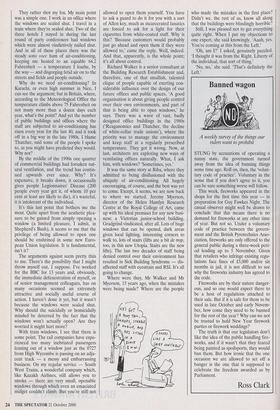Banned wagon
A weekly survey of the things our rulers want to prohibit
STUNG by accusations of operating a nanny state, the government turned away from the idea of banning things some time ago. Roll on, then, the 'volun- tary code of practice'. Voluntary in the sense that if you don't agree to it, you can be sure something worse will follow.
This week, fireworks appeared in the shops for the first time this year — in preparation for Guy Fawkes Night. The casual observer might well be drawn to conclude that this means there is no demand for fireworks at any other time of year. But not so. Under a voluntary code of practice between the govern- ment and the British Pyrotechnics Asso- ciation, fireworks are only offered to the general public during a three-week peri- od leading up to 5 November. Given that retailers who infringe existing regu- lations face fines of £5,000 and/or six months in jail, it is not difficult to see why the fireworks industry has agreed to the code.
Fireworks are by their nature danger- ous, and so one would expect there to be a host of regulations attached to their sale. But if it is safe for them to be used in late October and early Novem- ber, how come they need to be banned for the rest of the year? Why can we not be trusted to hold New Year firework parties or firework weddings?
The truth is that our legislators don't like the idea of the public handling fire- works, and if it wasn't that they feared being painted as spoilsports, they would ban them. But how ironic that the one occasion we are allowed to set off a banger is the one that is supposed to celebrate the freedom awarded us by Parliament.
Ross Clark

























































































 Previous page
Previous page